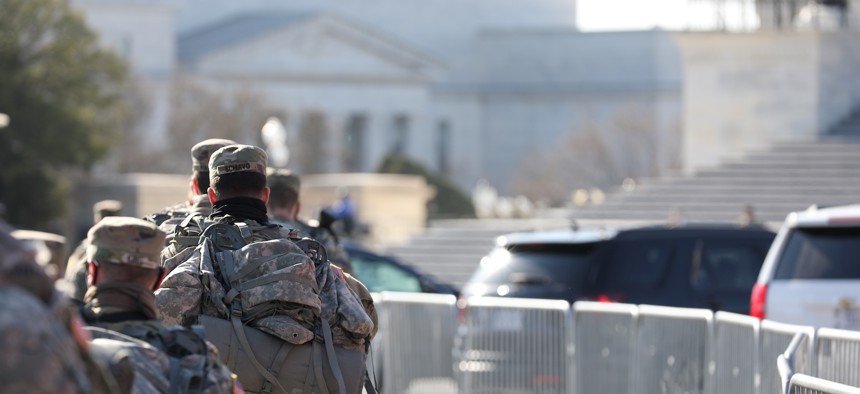
U.S. Soldiers with the Virginia National Guard march near the U.S. Capitol building in Washington, D.C., Jan. 14. Sgt. Andrew Walker/U.S. Army National Guard
Acting SecDef Defends Capitol Reaction, Says DoD Is Prepared for Next Week
Defense Department “absolutely” concerned about domestic terrorism next week but feels bureaucratic issues that delayed national guard are resolved.
COLORADO SPRINGS, Colorado — Tuesday’s phone call found acting Defense Secretary Christopher Miller cracking jokes with National Guardsmen in an auditorium in Nashville, Tennessee. His senior military advisor, Lt. Gen. Bryan Fenton, spoke briefly on the call, then approached Miller and whispered in his ear. The acting SecDef nodded his head in agreement. With that simple gesture, he authorized the Army Secretary to arm National Guard troops in the nation’s capital in advance of next week’s inauguration.
Miller on Thursday, speaking to reporters, said the Defense Department was well-prepared for the historically tense high-security event next week. “At this point, there’s a machine that’s cranking on that,” he told reporters aboard a Defense Department plane.
Miller said delegating authority for inauguration security was not a simple or easy choice; in fact, it went against his instincts.
“I have responsibility for everything, remember, and if something goes wrong I own it, completely, 110 percent. But the authorities you want to push down to where the people on the ground that are seeing things happen where[as] I’m sitting in the Pentagon or in my plane. So I made that decision to push them down to the Secretary of the Army [Ryan] McCarthy who is kinda down there on the ground so they can move faster,” he said. “We trust our people. You got to have them have what they need to move faster. Of course, then my thing is, ‘You have your left and your right limits. If you’re not comfortable, call me; I’ll give you some guidance. But otherwise, get going and move fast’.”
A senior Defense official said that the department is “absolutely concerned” about the prospect of domestic terrorism next week. Some 20,000 National Guard troops are expected to be in the nation’s capital at that time. Many are already in the Capitol. But the National Counterterrorism Center and others are warning of attacks that could take place elsewhere across the country. U.S. domestic law enforcement will take the lead on intelligence gathering and protection against specific threats.
Miller spent early Thursday meeting with Northern Command Commander Gen. Glen D. VanHerck, asking whether the command had all the authorities and resources it needed. “We talked through some scenarios, obviously,” he said. He arrived back in the capital region on Thursday afternoon.
But more than that, Miller said, he wanted to meet the commander. “You can have [virtual teleconferences] all day long, I wanted to look the guy in the eye. Get a sense for his soul. I think he needed to do that for me as well, so that was why I really thought it important to go out, sit down, have a cup of coffee with him, talk about it, small group, think through it.”
Miller has received much criticism in the week after insurrectionists loyal to Donald Trump stormed the U.S. Capitol to disrupt the certification of Joe Biden as the 46th U.S. president. National Guard troops arrived on the scene until hours after the riot started and after most of the rioters had been cleared. The building was declared secure at 8 p.m., by which time Guard troops had helped to set up a perimeter around it. Governor Larry Hogan of Maryland said that he wanted to send troops from Maryland immediately but that it took three hours to get permission. Army Secretary Brian McCarthy said he literally ran down the hall to get proper authorization.
Others have pointed to the byzantine nature of jurisdictional authorities and processes for sending armed reinforcements into the capitol as a leading cause of the delay, delays which could have, perhaps, been avoided had DHS red-teamed a scenario where-in such reinforcements were necessary.
On Tuesday, Miller defended how he handled the request. “The same people that morning that were concerned I was going to be a part of some military coup to overthrow the republic based on the fact ‘If there are military people on the streets can you imagine what signal that would send to America,’ the same people who did that that day were, by the end of the day, begging for armed soldiers in the Capitol.”
Miller said that his history working in counterterrorism, which culminated in his appointment as the director of the National Counterterrorism Center, gave him a particular appreciation for the legal and ethical challenges in dealing with domestic terrorism. “I worked through the whole domestic terrorism piece and, you know, it came back to the point of like, ‘Holy Cow, this is like a serious issue of civil liberties, of protecting the rights of Americans’…We talked and we had meetings and we had deputies… tons of meetings and work groups on domestic terrorism statute and designating domestic terror groups and at the time everybody was like ‘This is a slippery slope.’”
The senior Defense official said that the designation of the inauguration as a National Special Security Event should allow National Guard troops to move more easily when needed.
“Monday-morning quarterbacking is so goddamn easy,” said the official. “We had a valid request for 340 National Guard people to do a specific mission [on Jan. 6.] We had [quick reaction forces] set up. At the end of the day, fog and friction exist all the time and I tell you, [when] we go up to the Hill and the story is told, people will recognize we were in the right place at the right time. In terms of contingencies, holy cow, I can come up with contingencies for what we need to do this afternoon.”
NEXT STORY: GSA Administrator Resigns







